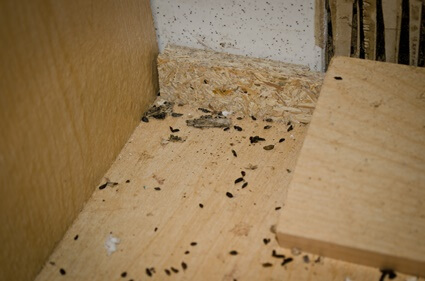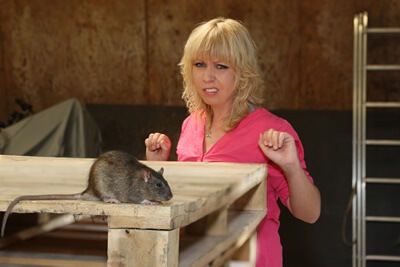The extreme and irrational fear of rats is called musophobia.
While most people have a rational fear of rodents based on the health and safety risks that rats carry, individuals with musophobia experience extreme fear and anxiety.
This is true even when there’s little or no threat. Although musophobia isn’t as well-known as other phobias, it’s believed to affect hundreds of tens of thousands worldwide.
Most phobias are undiagnosed, particularly if they relate to specific objects, activities, and situations. Since most of us aren’t aware of the types of phobias that exist, we may not realize they have one.
Moreover, the fact that rats evoke disgust in people means that most individuals who experience irrational and extreme thoughts, feelings, and behaviors around rats may not be aware that they have musophobia. Instead, they may believe that most people feel the way they do.
Consequently, most people exhibiting such irrational fears don’t receive a diagnosis.
Should I Be Scared of Rats?
Fears are often due to real dangers, but the disproportionate reactions they induce are the problem. Some of these fears include the following:
Fear of Infestation
It’s argued that most people with musophobia fear having their homes infested with rats.
This concern isn’t unfounded. Infestations can happen to anyone, even those with the cleanest or newest homes, and a rat population can grow exponentially.
You may only see one or two rats when far more are nesting in unseen places.
Moreover, rats reproduce quickly when the conditions are favorable. According to PLoS One, Norway rats can produce up to 79 offspring annually for every female.
Seeing one rat and becoming concerned about a full-blown infestation is a reasonable concern.
Experiencing a severe, life-disrupting reaction to the thought makes this concern a damaging phobia. Even if an infestation is present, there are ways to eradicate it quickly.

Fear of Contamination
It’s normal to dislike being near a rat or living in a space a rat has visited. Rats carry diseases and parasites, which can transmit illnesses to humans and other animals via physical contact or, in some cases, airborne contamination.
According to Clinical Microbiology Review, rats are primarily asymptomatic carriers, meaning they don’t suffer from the illnesses themselves or manifest any signs.
This allows the rats to pick up additional pathogens or store them inside their body, making a single rat into a host of unpleasant, harmful, or deadly contaminants.
Catching a disease is unlikely if you take precautions, such as disinfecting surfaces the rat has touched, not handling rats, and wearing face protection if you locate a nest.
Due to advancements in medicine, even most ailments caught from a rat are treatable.
Fear of Being Bitten or Scratched
People experiencing musophobia may be terrified by the thought (or by the perceived certainty) that a rat will attack them. Some are terrified of the higher chances of disease being transmitted to them through an open wound. Others are directly concerned about the bites and scratches themselves.
Rats have sharp teeth and claws, and their bite force is enough to bite through materials like concrete or metal. Despite that, this is one of the less reasonable fears because rat attacks are virtually nonexistent.
Rats are fearful scavengers who like to keep to themselves, move out of sight, and avoid predators (or larger animals, like humans) at all costs. A rat will not attack you unless you try to pick it up or touch it, leaving it no choice but to defend itself. It’ll always choose to run or hide if given a chance.
The bite or scratch may not even draw blood. If it does, it can be easily treated. This slight injury won’t be any worse than a cat scratch. Even when cornered, rats are unlikely to bite with full force.
What Triggers The Fear Of Rats?
The fear of rats can be triggered by many factors, depending on how the phobia initially started, how extreme it is, and an individual’s current mental state. The most common triggers for musophobia include:
- Real-life encounters with rats or mice.
- Thinking about rats or mice.
- Hearing sounds that rats and mice usually produce, such as squeaking or scratching.
- Listening to negative second-hand experiences involving rats.
- Watching portrayals of rats and mice on TV or looking at pictures of them.
- Seeing an object that looks like a rat or mouse.
Fear of Rats Symptoms
Musophobia symptoms differ significantly. This is based on the severity of the individual’s phobia, their triggers, the current state of mental health, and coping mechanisms.
Some people experience mild symptoms that they can manage, while others experience more extreme symptoms that are far harder to cope with.
Remember that your symptoms may also vary based on the perceived threat and how close you are to it. For instance, most people experience pronounced symptoms if they encounter a rat inside their home, and the reaction may be less if they see a rat in a picture.
Likewise, some people only experience symptoms when they encounter a rat or mouse in real life. Others may experience intense anxiety and fear even in the absence of the rats. Here are common physiological symptoms you may experience with musophobia:
- Heart palpitations or increased heart rate.
- Difficulty breathing or rapid breathing.
- Light-headedness.
- A feeling of tightening in the chest.
- Stomach upset is often accompanied by nausea and vomiting.
- Increased blood pressure.
- Body tremors or trembling.
- Sweating accompanied by chills.
- Inability to sleep (insomnia).
- Freeze response or feeling unable to move.
- Loss of appetite.
In addition to these symptoms, musophobia may be characterized by psychological symptoms such as:
- Overwhelming anxiety.
- Immediate and intense fear or panic.
- A sense of impending doom.
- A sudden fear of death or dying.
- Difficulty functioning when triggered.
- Disorientation or confusion.
How To Overcome Fear of Rats
Musophobia might seem irrational and trivial for people who don’t experience or understand it. However, it’s a genuine phobia that has a considerable effect on a person.
The extent of the reaction may be extreme, and the root fears may be irrational in the sense that they move beyond realistic concerns, but that doesn’t mean they’re unimportant or easy to discard.
Individuals affected by a phobia of rats often have difficulty living normally. Whether it’s due to the physiological effects or the mental strain, musophobia can be highly disruptive to a person’s mental health and daily routine.
Most attempt to deal with their fear by avoiding environments and situations where they’ll encounter or be reminded of rats.
While it’s a sensible approach, it’s rarely a practical, long-term solution. Whether real-life encounters, pop culture references, or second-hand exposure, rats can’t be eradicated from most people’s lives.
Addressing the phobia can help you address the triggers and, by extension, alleviate the symptoms you may experience. Fortunately, there are coping strategies that you can employ to manage your phobia more successfully. These include:
Educate Yourself On Rats
People often develop musophobia due to long-held beliefs and misconceptions about rats. Granted, these beliefs frequently stem from negative experiences in the past and the associations they developed.
Likewise, some are built off of core truth, such as that rats carry disease. However, these truths are often overblown, with myths saying that contact with a wild rat will guarantee illness.
Therefore, learning about rats is an effective way to cope with fear. Doing so will help you understand that these tiny creatures pose a low threat to humans.

Understand Your Phobia
Phobias are often difficult to cope with because they trigger a primal sense of danger, pushing us into survival mode. In this state, it can be difficult to think clearly, leading to reacting in disproportionate ways to the perceived threat.
Taking the time to study yourself and understand where your phobia stems from is helpful. Realizing what your triggers are can help you think more rationally when you are triggered.
This, in turn, will help you regulate your emotions and have more control over your reactions.
Practice Taking Rational Steps
Reasonably safeguarding your home against rats (be they one or many) is a good way of balancing the irrationality of musophobia with sensible precautions.
You don’t need to avoid thoughts of rats at all times, but you can also take steps to ensure your home doesn’t develop a rodent problem.
This will allow you to take actionable steps to process your fears and help you practice measured rational responses. For example, instead of compulsively spraying poison around your home or even leaving home altogether, you can:
- Seal off potential entry points, such as cracks on your walls and flooring.
- Keep your attics, basements, and sheds clean, dry, and well-ventilated.
- Dispose of your trash properly.
- Store your food in rat-proof containers.
- Maintain your yard by trimming grass and pruning overgrown trees.
- Consider getting a pet that wards off rats, such as a cat or ferret.
Avoid Catastrophizing
When you have an extreme fear of rats, even the mere thought of an encounter may cause crippling panic and anxiety. However, entertaining these negative thoughts worsens your symptoms.
Instead of obsessing over negative scenarios, remember that rats don’t threaten you, and you’re safe. If you experience physiological symptoms, reassure yourself that your fear is irrational and will pass soon.
It may help you process the worst-case scenario for a measured amount of time. For 10 minutes, think about the worst thing that could happen.
Then, remind yourself of the solutions available to you. Focus on these resolutions and how they can help soothe your base fear.
For example, you may be terrified of an infestation, so remembering that pest control services can help will ensure the fear doesn’t spiral into infinity.
You may even be comforted by researching local options to help you understand that, should the worst happen, you’re in control and can make the problem disappear.








